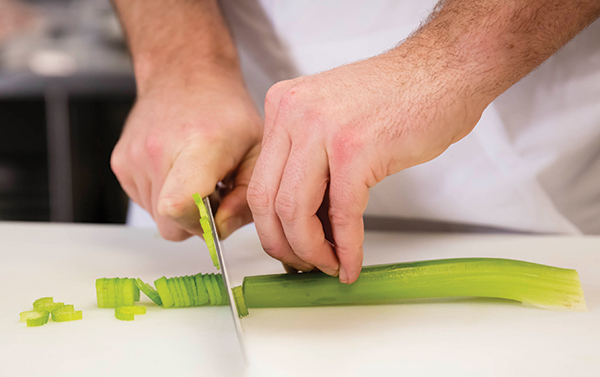Video series — Kitchen safety advice from the pros
Commercial kitchens, from small cafes to institutional settings, are fast-paced environments with many hazards.

The hours can be long, and the work can be stressful — a recipe that can lead to accidents and injuries. Common injuries for kitchen workers include burns, scalds, cuts, amputations, musculoskeletal and repetitive motion injuries, and slips and falls. Some injuries can be fixed with a bandage, while others may require extensive time off work for recovery.
“The success that I have in my career is due, in part, to the fact that I work safely. That was instilled in me as a young cook.” Jeff Szombaty, executive chef, Hyatt Regency Vancouver
According to industry research, employers report that kitchen positions are hard to fill, and 73 percent of employers with a vacancy see themselves facing a labour shortage, even for entry-level positions such as dishwashers and kitchen assistants. Workers are a valuable resource, and it’s important for employers to know how to maintain a safe and healthy workplace.
“In a small restaurant, when you only have six cooks, if somebody’s down for a couple of weeks or a month with an injury, you’ve lost (nearly) 20 percent of your workforce.” Dennis Green, executive chef, go2HR
As an employer, it’s your responsibility under the Occupational Health and Safety Regulation to make sure your workers are trained and know how to carry out all aspects of their job correctly. Whether it’s a new worker who has little experience in a kitchen, or an experienced worker who is using new equipment, investing in health and safety helps to keep them safe, keeps other workers safe, and keeps your business running smoothly.
“Safety’s always been a consideration in the kitchen ... An injury today can potentially stay with you for a very long time.” Isabel Chung, executive chef, Fairmont Chateau Whistler
There are about 40,000 chefs and cooks and more than 45,000 food counter attendants and kitchen helpers in B.C. They work in a variety of businesses, including fast-food and full-service restaurants, family-run cafes, remote resource camps, summer camps, and institutional kitchens. The resources below will help you provide important training for your workers, regardless of the size or location of your business.
Kitchen safety videos
We have developed a series of short training videos in partnership with go2HR, featuring interviews and insights from well-known executive chefs in B.C. They share their real-life perspectives on the importance of kitchen safety and offer lessons from their own experiences. These videos demonstrate proper techniques for using equipment and performing common tasks, including:
- Kitchen Safety: Focusing on Safety
- Kitchen Safety: Preventing Cuts from Knives
- Kitchen Safety: Preventing Cuts from Meat Slicers
- Kitchen Safety: Preventing Burns and Scalds
- Kitchen Safety: Using Deep Fryers Safely
- Kitchen Safety: Preventing Slips, Trips, and Falls
- Kitchen Safety: Preventing Lifting Injuries
More resources
For additional tourism and hospitality resources, visit www.worksafebc.com/hospitality.
